康德名言英文
康德名言英文带翻译
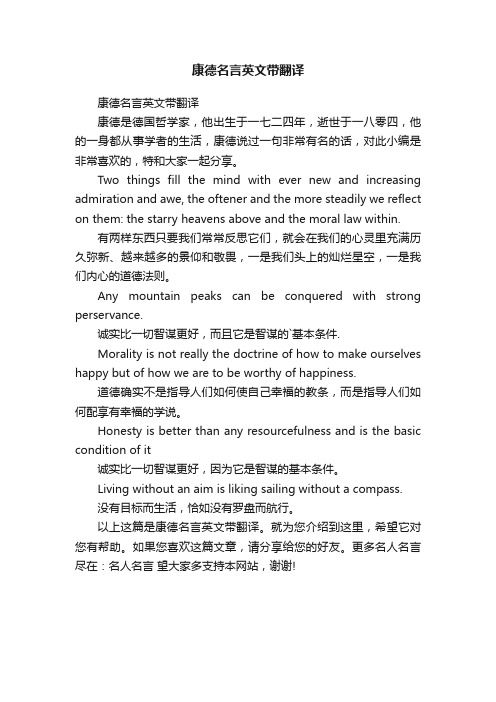
康德名言英文带翻译康德名言英文带翻译康德是德国哲学家,他出生于一七二四年,逝世于一八零四,他的一身都从事学者的生活,康德说过一句非常有名的话,对此小编是非常喜欢的,特和大家一起分享。
Two things fill the mind with ever new and increasing admiration and awe, the oftener and the more steadily we reflect on them: the starry heavens above and the moral law within.有两样东西只要我们常常反思它们,就会在我们的心灵里充满历久弥新、越来越多的景仰和敬畏,一是我们头上的灿烂星空,一是我们内心的道德法则。
Any mountain peaks can be conquered with strong perservance.诚实比一切智谋更好,而且它是智谋的`基本条件.Morality is not really the doctrine of how to make ourselves happy but of how we are to be worthy of happiness.道德确实不是指导人们如何使自己幸福的教条,而是指导人们如何配享有幸福的学说。
Honesty is better than any resourcefulness and is the basic condition of it诚实比一切智谋更好,因为它是智谋的基本条件。
Living without an aim is liking sailing without a compass.没有目标而生活,恰如没有罗盘而航行。
以上这篇是康德名言英文带翻译。
就为您介绍到这里,希望它对您有帮助。
如果您喜欢这篇文章,请分享给您的好友。
更多名人名言尽在:名人名言望大家多支持本网站,谢谢!。
哲学家康德名言大全,康德关于自由的名言、道德律名言

哲学家康德名言大全,康德关于自由的名言、道德律名言1、Freedom is not letting you do whatever you wanna but teaching you not to do the things you don't wanna do. 自由不是让你想做什么就做什么,自由是教你不想做什么,就可以不做什么。
——伊曼努尔·康德2、世界上有两件东西能震撼人们的心灵:一件是我们心中崇高的道德标准;另一件是我们头顶上灿烂的星空。
——康德3、发怒,是用别人的错误来惩罚自己。
——康德4、大海之所以伟大,除了它美丽、壮阔、坦荡外,还有一种自我净化的功能。
——康德5、三样东西有助于缓解生命的辛劳:希望,睡眠和微笑。
——康德6、要评判美,就要有一个有修养的心灵。
——康德7、痛苦就是被迫离开原地——康德8、天才是自创法则的人。
——康德9、世界上唯有两样东西能让我们的内心受到深深的震撼,一是我们头顶浩瀚灿烂的星空,一是我们心中崇高的道德法则。
——康德《实践理性批判》10、良心是一种根据道德准则来判断自己的本能,它不只是一种能力;它是一种本能。
——康德11、诚实比一切智谋更好,而且它是智谋的基本条件。
——康德12、越是处心积虑地想得到生活上的舒适和幸福,那么这个人就越是得不到真正的满足。
——康德《道德形而上学原理》13、一个人的缺点来自他的时代,他的美德和伟大却属于自己。
——康德14、我们越是忙越能强烈地感到我们是活着,越能意识到我们生命的存在。
——康德15、我们所有的知识都开始于感性,然后进入到知性,最后以理性告终。
没有比理性更高的东西了。
——康德16、如果竭尽自己最大努力仍然还是一无所得,所剩下的只是善良意志,它诚如沉睡的宝石一样,自身就发射着耀目的光芒,自身之内就具有价值。
——康德《道德形而上学原理》17、"Only two things in this world so that our souls are deeply shocked First, 这个世界惟有两样东西让我们的心灵感到深深的震撼, our brilliant stars overhead, First,"ourheartslofty morallaws."一是我们头顶上灿烂的星空,一是我们内心崇高的道德法则. ——康德《实践理性批判》" 18、对自然美抱有直接兴趣……永远是心地善良的标志。
德国哲学家康德30句名言

德国哲学家康德30句名言1.有两种东西,我对它们的思考越是深沉和持久,它们在我心灵中唤起的惊奇和敬畏就会日新月异,不断增长,这就是我头上的星空和心中的道德定律。
2.自由不是让你做任何想做的事,而是做你应当做的事。
3.人是目的,而非手段。
4.理性是为自身立法的能力。
5.道德法则就是:永远按照你希望它成为普遍法则的准则去行动。
6.理性是唯一能判断何为善何为恶的。
7.道德的最高原则是:行动,只按照你同时也希望它成为普遍法则的准则去行动。
8.理性是道德行为的唯一裁判。
9.人应当被当作目的本身,而不仅仅是达到目的的手段。
10.理性是道德行为的唯一源泉。
11.理性是自由的唯一基础。
12.道德行为的真正价值在于它出于对法则的尊重。
13.我们不能通过经验来认识道德法则。
14.理性是道德行为的唯一指导。
15.道德法则的尊严在于其普遍性和必然性。
16.道德的最高原则是:行动时,将人当作目的,而不仅仅是手段。
17.理性是唯一能够判断何为善何为恶的。
18.理性是道德行为的唯一裁判。
19.理性是唯一能够理解道德法则的。
20.道德的尊严在于它超越了个人利益。
21.理性是道德行为的唯一基础。
22.道德行为的真正价值在于它出于对道德法则的尊重。
23.理性是唯一能够理解道德法则的本质。
24.道德行为的尊严在于它超越了个人利益。
25.道德的最高原则是:行动时,将人当作目的本身,而不仅仅是达到目的的手段。
26.理性是唯一能够判断何为善何为恶的。
27.理性是唯一能够理解道德法则的普遍性和必然性。
28.道德行为的真正价值在于它出于对道德法则的尊重和遵循。
29.理性是唯一能够理解道德行为的真正价值。
30.道德的最高原则是:行动时,将人当作目的本身,而不仅仅是达到目的的工具。
道德的英文名言
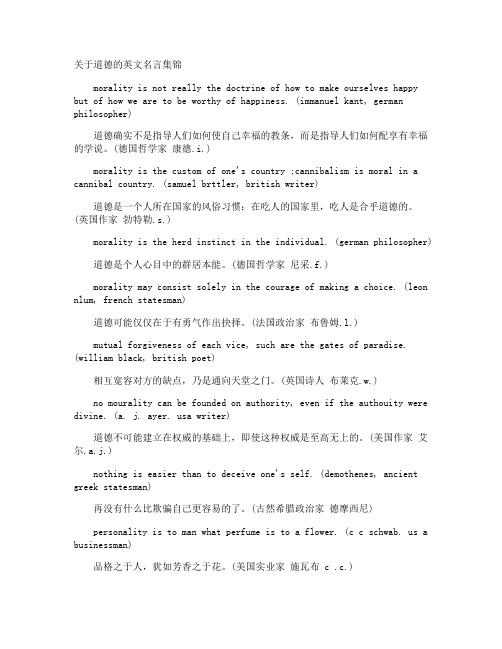
关于道德的英文名言集锦morality is not really the doctrine of how to make ourselves happy but of how we are to be worthy of happiness. (immanuel kant, german philosopher)道德确实不是指导人们如何使自己幸福的教条,而是指导人们如何配享有幸福的学说。
(德国哲学家康德.i.)morality is the custom of one's country ;cannibalism is moral in a cannibal country. (samuel brttler, british writer)道德是一个人所在国家的风俗习惯:在吃人的国家里,吃人是合乎道德的。
(英国作家勃特勒.s.)morality is the herd instinct in the individual. (german philosopher)道德是个人心目中的群居本能。
(德国哲学家尼采.f.)morality may consist solely in the courage of making a choice. (leon nlum, french statesman)道德可能仅仅在于有勇气作出抉择。
(法国政治家布鲁姆.l.)mutual forgiveness of each vice, such are the gates of paradise. (william black, british poet)相互宽容对方的缺点,乃是通向天堂之门。
(英国诗人布莱克.w.)no mourality can be founded on authority, even if the authouity were divine. (a. j. ayer. usa writer)道德不可能建立在权威的基础上,即使这种权威是至高无上的。
考研英语作文热点预测:道德问题
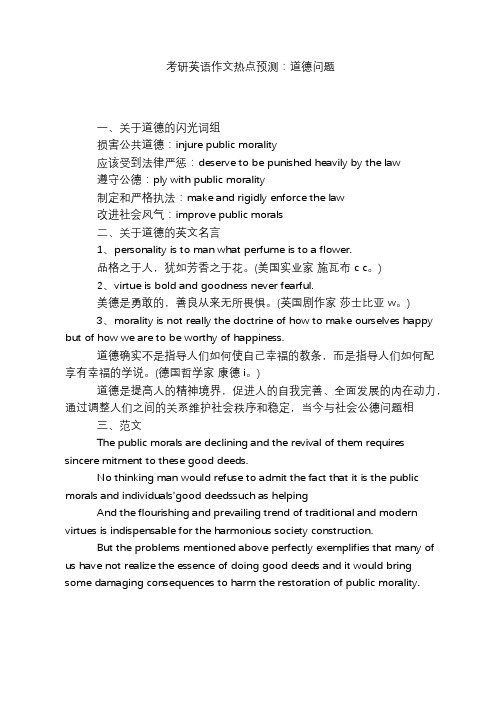
考研英语作文热点预测:道德问题一、关于道德的闪光词组损害公共道德:injure public morality应该受到法律严惩:deserve to be punished heavily by the law遵守公德:ply with public morality制定和严格执法:make and rigidly enforce the law改进社会风气:improve public morals二、关于道德的英文名言1、personality is to man what perfume is to a flower.品格之于人,犹如芳香之于花。
(美国实业家施瓦布 c c。
)2、virtue is bold and goodness never fearful.美德是勇敢的,善良从来无所畏惧。
(英国剧作家莎士比亚 w。
)3、morality is not really the doctrine of how to make ourselves happy but of how we are to be worthy of happiness.道德确实不是指导人们如何使自己幸福的教条,而是指导人们如何配享有幸福的学说。
(德国哲学家康德i。
)道德是提高人的精神境界,促进人的自我完善、全面发展的内在动力,通过调整人们之间的关系维护社会秩序和稳定,当今与社会公德问题相三、范文The public morals are declining and the revival of them requires sincere mitment to these good deeds.No thinking man would refuse to admit the fact that it is the public morals and individuals’good deedssuch as helpingAnd the flourishing and prevailing trend of traditional and modern virtues is indispensable for the harmonious society construction.But the problems mentioned above perfectly exemplifies that many of us have not realize the essence of doing good deeds and it would bring some damaging consequences to harm the restoration of public morality.(提出解决的办法)Were the situation to continue as it is we would pay the high priceIt is high time that we enhanced the real sense of the importance of public morals Specifically.。
璀璨的智慧·康德名言荟萃(英语翻译原创·二)

璀璨的智慧·康德名言荟萃(英语翻译原创·二)Immanuel Kant Quotes About Ethics康德关于伦理学的名言21. In scientific matters … the greatest discoverer differs from the most arduous imitator and apprentice only in degree, whereas he differs in kind from someone whom nature hasendowed for fine art. But saying this does not disparage those great men to whom the human race owes so much in contrast to those whom nature has endowed for fine art.在科学问题上……最伟大的发现者与最艰苦的模仿者以及学徒只在程度上有所不同,而他与自然赋予艺术天赋的人在性质上是有所差异的。
但这样说并没有贬低那些人类应该归功的伟人,不包括那些大自然赋予艺术天赋的伟人。
For the scientists’ talent lies in continuing to increase the perfection of our cognitions and on all the dependent benefits, as well as in imparting that same knowledge to others; and in these respects they are far superior to those who merit the honour of being called geniuses. For the latter’s art stops at some point, because a boundary is set for it beyond which it cannot go and which has probably long since been reached and ca nnot be extended further.”因为科学家的才能在于不断地提高和完美我们的认知,在于给人类带来不可或缺的利益,同时他们把同样的知识传授给其他人;在这些方面,他们远远优于那些值得称为天才的人。
康德名言英文
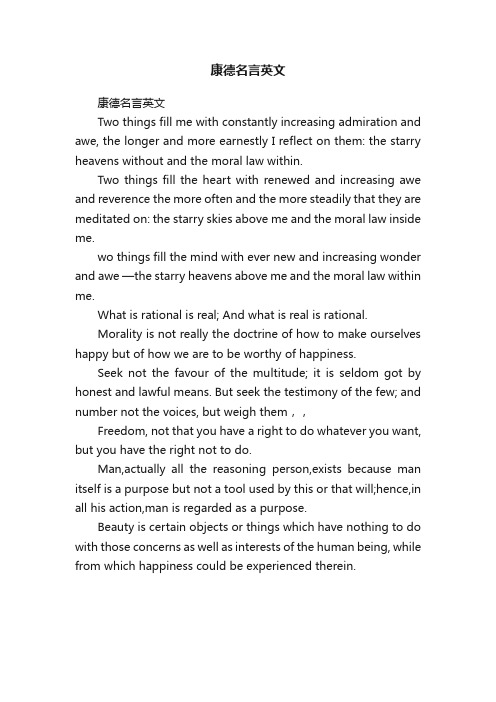
康德名言英文康德名言英文Two things fill me with constantly increasing admiration and awe, the longer and more earnestly I reflect on them: the starry heavens without and the moral law within.Two things fill the heart with renewed and increasing awe and reverence the more often and the more steadily that they are meditated on: the starry skies above me and the moral law inside me.wo things fill the mind with ever new and increasing wonder and awe —the starry heavens above me and the moral law within me.What is rational is real; And what is real is rational.Morality is not really the doctrine of how to make ourselves happy but of how we are to be worthy of happiness.Seek not the favour of the multitude; it is seldom got by honest and lawful means. But seek the testimony of the few; and number not the voices, but weigh them,,Freedom, not that you have a right to do whatever you want, but you have the right not to do.Man,actually all the reasoning person,exists because man itself is a purpose but not a tool used by this or that will;hence,in all his action,man is regarded as a purpose.Beauty is certain objects or things which have nothing to do with those concerns as well as interests of the human being, while from which happiness could be experienced therein.。
康德的绝对道德伦【英文】
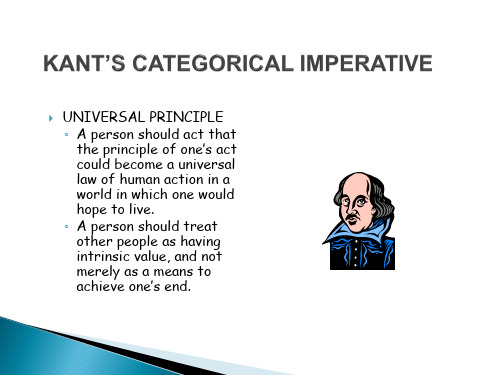
Adam Smith
◦ The Wealth of Nations
It is not from the benevolence of the butcher, the brewer,or the baker that we expect out dinner, but from their own interest. We address not heir humanity but their self-love
WHAT IS TRUTH? WHAT IS A LIE?
TRUTH TELLING LEADS TO DISCOURSE WHICH LEADS TO FELLOWSHIP WHICH LEADS TO FORMATION OF A SOCIETY
SILENCE ◦ Not an option because it is view as unsocial SECRETS ◦ Telling secrets is like giving presents and a nature inclination. Strength is in keeping them. TRUTH ◦ Important because one of two way to gain knowledge. The other is experience.
ANY ACT THAT WORKS AGAINST FRANKNESS LOWERS THE DIGNITY OF HUMAN KIND
IS IT APPROPRIATE FOR BUSINESS TO HAVE ITS OWN ETHICAL RULES?
康德英文经典语录

康德英文经典语录康德英文经典语录伊曼努尔・康德(Immanuel Kant, 1724年4月22日―1804年2月12日)德国哲学家、天文学家、星云说的.创立者之一、德国古典哲学的创始人,唯心主义,不可知论者,德国古典美学的奠定者。
他被认为是对现代欧洲最具影响力的思想家之一,也是启蒙运动最后一位主要哲学家。
以下是康德英文经典语录,欢迎阅读。
1、You don't want to do the things you want to do.2、Freedom is not letting you do what you want, freedom is teaching you not to do what you don't want to do.3、There are two things in the world that can shake people's minds: one is the high moral standard in our hearts. The other is the starry sky above us.4、To be angry is to punish yourself with someone else's mistake.5、Three things help to alleviate life's hard work: hope, sleep and smile.6、The sea is great except for its beauty, grandeur, and transparency, and a function of self-purification.7、There are only two things in the world that can make us feel deeply shocked. One is the vast and brilliant sky above us, and one is the high moral law in our hearts.8、A man's faults come from his days, his virtues and greatness are his own.9、The more you think about the comfort and happiness of life, the more you won't be truly satisfied.10、A glass of water is clear, but the sea is black. Like little truth, the real truth is silence11、Only two things in this world so that our souls are deeply in the First place.12、The only two things in the world that make our hearts feel deeply shocked,13、Our brilliant stars overhead, First, our hearts' moral laws.14、One is the brilliant sky above us, one is our inner noble moral law.15、Genius is the man of the law.16、Pain means being forced to leave17、To judge beauty, we must have a cultured mind.18、Conscience is an instinct to judge itself according to a moral code; it is not just an ability; It's an instinct.19、The morality of a behavior does not depend on its outcome, but on the intent behind it.20、If tried their best to still get nothing, all that's left is good will, it as sleeping gems, itself is launching a dazzling ray of light, within its own value.21、The busier we are, the more strongly we feel that we are alive, and the more we realize the existence of our lives.22、Honesty is better than everything, and it is the basic condition of resourcefulness.23、All our knowledge begins with sensibility, then into the understanding, and ends with reason. Nothing is better than reason.24、A man's words must be true, but he doesn't have to tell them what he knows.25、To my superior, the starry sky; Moral law in my heart.26、Freedom is not what you want to do, but what you don't want to do27、Have a direct interest in natural beauty... Always a sign of kindness.28、A person has no confidence and doesn't want to get up the next day.29、Since I am on this path, nothing should stop me from following this path.30、Since I have already embarked on this path, then nothing should prevent me to go down this road.31、There are two things, the more I think about them deep and lasting, they evoked admiration and fear in my heart will be more and more enduring, a vast brilliant starry heavens above is our, one is our lofty moral law in my heart. They confirm to me that god is on my head and in my heart.32、There is often two ways of thinking. To be feared, to be renewed with the sun; The upper is the stars, the next is virtue.33、Zwei Dinge erfullen das Gemut MIT immer neuer und zunehmender Bewunderung und Ehrfurcht, je fter und anhaltender sich das Nachdenken damit beschftigt: Der bestirnte Himmel uber mir, und d34、The request of a child should be satisfied without sufficient cause to reject it. If there is a reason for not agreeing to such a request, he is not allowed to play it. Once you refuse, don't change.35、There are only two things in the world that deserve our deep admiration. One is the brilliant sky above us, and the other is the noble moral law of our hearts.36、Morality is first required to govern oneself37、One of the most complex tasks of education is to combine the mandatory law of obeying the law into education with its own free power. As long as the child does not do anything harmful to himself and others, he should let them have the freedom to act, not to change the child's will. Let children understand that they can only achieve their purpose by providing others with the possibility of achieving their goals.38、Man, in fact, is all rational, so it exists because it is a purpose and is not a tool for this or that purpose39、He who is not immediately disgusted with the wicked, who is not immediately pleased with the beauty, and who has no sense of morality,has no conscience. Who made the wicked things and fear was sentenced to only, not due to misconduct and blame themselves, but by the thoughtthat painful consequences dare, this kind of person also have no conscience, and only the surface of the conscience. But who can be aware of the lack of virtue in the act itself, without considering the consequences, but with a conscience.40、Beauty is a symbol of moral goodness.41、The more I think about two things, the more awestruck and awe I feel, and that is the starry sky above me and the moral code of my heart.42、Be as happy as a young man in old age! Youth, like a lark, has his morning song. Old age, like nightingale, should have his nocturnes.43、For his own happiness is a purpose for all, for the impulses of his nature, but the purpose is never to be seen as an obligation, butnot a contradiction. Inevitably, everyone automatically wants something that is not an obligation; The duty is to impose a purpose that is not readily accepted. It is, therefore, paradoxical to say that one has an obligation to contribute to his own happiness. -44、There are two things, and the deeper they look at them, the more awe and awe they evoke in my mind, which is the moral law of the stars and hearts above.45、Enlightenment is man who comes out of his own custody. The state of being guardianship is that you cannot use your own rational state without the guidance of others. If this state of guardianship is not due to lack of reason, but to the lack of determination and courage to use one's own mind without the guidance of others, it is to blame. So Sapere aude [dare to know]! Have the courage to use your own sanity!46、Morality is indeed not a doctrine that guides people how to make themselves happy, but rather instructs people on how to deserve happiness.47、The so-called religion is to regard all our obligations asorders of god48、The duty of philosophy is to remove the illusions that are born of misunderstanding.49、The venerable "personality" concept, side make us from beginning to notice their behavior with it owes, and for some down the suppression of our ego, at the same time has enabled us to clearly see the sublime our nature; This idea is natural and obvious in the most ordinary human reason. The man who is not ashamed of himself sometimes finds that he can lie to get rid of some kind of unsavory lie. Or even for somebenefit to his dear and dear friend, but he was afraid to sneer, and never lie? An upright person so long as abandoned duties, the original can get rid of some kind of mess, and its so painstakingly, stick to it, not because he consciously to such ability can lead by example, maintain the dignity of the people, to respect, can50、The rational hand holds its own principles, and in the other hand, we study and experiment with that principle, and go to nature.51、Wine can give a quick speech, and wine can make a man's heart. Wine, therefore, becomes a material of moral character to carry out the heart of the direct52、The most taboo thing in beauty is to disgust people, but to the sublime is to make people laugh. So the most painful thing for a man is that you say he's incompetent, and women hate you to say she's ugly.53、The thing that fills my heart is the sky of the stars, and the moral law of my heart.54、When love needs me I am not qualified, when I need love, he is away from me55、The two things that most astonish and shock us most are the stars in the sky and the moral law of our hearts.56、He deserves to be unhappy that he can only be happy according to the choice of others. For how could he vouch for his strong neighbour to be in agreement with his own judgment in the judgment of choice?57、What I fear is the sky and the moral law of the heart58、People is the ultimate goal of life to create, as one is the only two there is a concept that can form the purpose of, can be formed from a pile of purposeful thing, with the aid of his reason, and constitute the purpose of a system59、Philosophy cannot be taught; philosophy is always the cause of thinkers.60、There are two things in this world that I remember in awe, the starry sky above us and the moral law of our hearts.61、In the natural process of human understanding, it is not the things that affect people, but people that affect things. It is our people who are constructing the real world. In the process ofrecognizing things, people are more important than things themselves. It is impossible for us to realize the truth of things, we can only knowthe appearance of things.62、Beauty is a symbol of morality.63、Beauty is joy without purpose.64、Greed is an endless desire for the outside world.65、There are only two things in the world that I am in awe of, oneis the brilliant sky above me, and one is the eternal moral law in my heart.66、There are two things, the more I think about them deep and lasting, they arouse in my mind wonder and awe will be changing, growing, this is the sky on my head and the heart of the moral law.67、There are two things, the more I think back to the number, the longer, they are filled with the more I see the time often new, time always increases the feeling of amazement and serious, the stars and the moral law that is my head.68、There are two kinds of things, and the longer we think about it, the more we are awed and awed by it: the starry sky and the inner moral law.69、As long as you do your duty, people will sincerely respect you.70、There are two kinds of awe, one is the infinite sky above the head, the other is the innermost thoughts.71、Shyness is a secret of nature to suppress a desire to indulge;It is a natural calling, but always in harmony with virtue and virtue.72、The most wonderful thing in the world is the brilliant sky and the moral code of my heart.73、The so-called religion refers to all our obligations as god's orders.74、Two things fill the mind with ever-increasing wonder and awe, the more often and the more the mind of thought is drawn to them: the starry heavens above me and the moral law within me.75、Living without a goal is like sailing without a compass.76、"When moral punishment is no longer effective, people are put to physical punishment, but good character cannot be created through it."77、When parents are at education, they usually just let them adapt to the current world - even if it's a decadent world. This is a true portrayal of many Chinese parents. The offspring continue and survive, which has the meaning of animal evolution, but it is very unhuman to be the only one to pursue it. To give birth to a child only to add to the slave owner, such parents do not deserve to say that they love their children.78、Give me the matter, and I'll make a universe out of it.79、There are two kinds of things, and the more abnormal we think, the more we fill our hearts with the admiration and awe that is always fresh and growing: the stars in my head and the morals of my heart.80、There are two things, and the more they continue to meditate and meditate, the more they will be filled with renewed and growing praise and awe: the sky and the moral law of the heart.81、Men are easy to see, but women don't reveal their secrets.82、The most wonderful thing in the world is the brilliant sky and the moral code of my heart83、Comical is the serious imbalance between expectation and consequence.84、There are two things that can happen to people's hearts. One is the brilliant sky above the head, and the other is the high moral principle in our hearts85、Three things help alleviate the strain of life: hope, smile, and sleep.86、Beauty is a joyless joy87、Experience tells us something like this, but it doesn't tell us it can't be something else88、All knowledge begins with experience, but it is not the empirical knowledge that originates from experience. It is a complex of the impression we accept and the capacity we have. Innate knowledge: not dependent on experience, completely independent of experience, that is, "pure". Before, the metaphysics was more and more original, and the purpose of Kant was to clarify the scope, rules and bounds of reason, and put metaphysics on the path of spectrum. Is husserl's phenomenology more advanced?89、To be true, or to judge the subjective validity of the judgment, is to make sure that there are three levels in the relationship between (it is also objective and valid) : opinions, beliefs and knowledge. Opinion is a kind of perception that is both subjective and objectively inadequate. It is called a belief if it is to be seen as merely subjective and objectively inadequate. Finally, subjectivity and objectivity are sufficient to be regarded as knowledge. One of the joys of reading is discovering that you and the greatest thinker of all time come to think of it. I thought of knowledge and opinion long before I read it...90、"The only thing we know for sure is that we are going to die." As death, it seems to be the experience of seeing the death of something else. However, this proposition is an inevitable proposition. It might be said, however, that there is no such thing as Enoch, so it is still a "undiscovered exception" rule of thumb.91、Metaphysics is a completely isolated, speculative and rational knowledge。
康德美学思想 英文
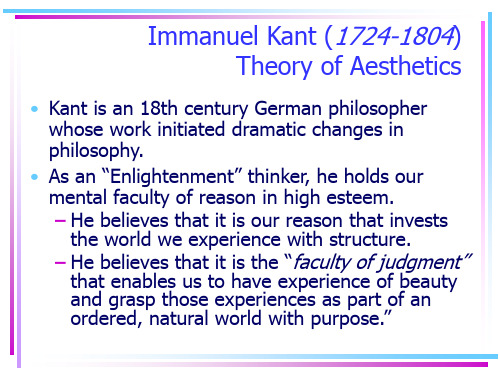
Kant's Aesthetics The Judgment of the Beautiful II & III
– Second and third, such judgments are both universal and necessary. • We may say beauty is in the eye of the beholder, but that‟s not how we act. • There is no objective property of a thing that makes it beautiful. – For Kant necessity and universality are a product of features of the human mind – what he calls “common sense”
Kant's Aesthetics The Judgment of the Beautiful I
The Critique of Judgment begins with an account of beauty. Kant argues that such aesthetic judgments (or 'judgments of taste') must have four key distinguishing features. – First, they are disinterested – we take pleasure in something because we judge it beautiful rather than the other way around. • If we judge something pleasurable because it is beautiful, it is more like the judgment of what is agreeable.
康德哲学术语表(英文)

康德哲学术语表(英文)康德术语表英文Glossary of Kant's Technical TermsThe following Glossary lists Kant's most important technical terms, together with a simple definition of each. (The terms 'judicial','perspective' and 'standpoint' are the only ones Kant himself does not use as technical terms.) It was originally written as a study aide to help make the intricate web of Kant's terminology comprehensible to students who had little or no familiarity with Kant's writings. Where relevant, the opposite term is given in curved brackets at the end of the definition. When a word defined herein (or a slightly different form of such a word) is used in the course of defining some other word inthis Glossary, its first occurrence in that definition will be in italics.下面的术语表列举了康德最重要的技术性概念~同时在每个概念之后附上一个简单的定义。
康德名言名句

康德名言名句英文回答:Here are some of my most famous quotes:"The starry sky above me and the moral law within me fill me with awe.""The greatest thing in the world is the practical reason, pure and itself practical, independent of all sensuous impulses, as a faculty that determines the will according to laws which it prescribes to itself.""Freedom is the independence of the will from the laws of nature, and the subjection of the will only to its own universal laws.""The categorical imperative is the ground of all moral obligation.""The human mind is not a tabula rasa, but rather a priori forms of sensibility and understanding that structure our experience of the world."中文回答:以下是我的部分名言警句:"头顶的星空和内心的道德律令,使我心生敬畏。
""世界上最伟大的东西是实践理性,它纯洁而实用,独立于一切感官冲动,作为一种根据它自己规定的规律决定意志的能力。
【精编范文】康德的墓志铭解析-优秀word范文 (15页)
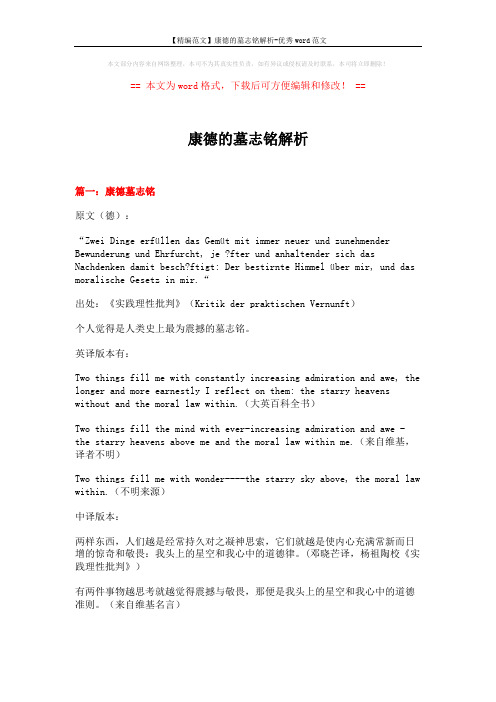
本文部分内容来自网络整理,本司不为其真实性负责,如有异议或侵权请及时联系,本司将立即删除!== 本文为word格式,下载后可方便编辑和修改! ==康德的墓志铭解析篇一:康德墓志铭原文(德):“Zwei Dinge erfüllen das Gemüt mit immer neuer und zunehmender Bewunderung und Ehrfurcht, je ?fter und anhaltender sich das Nachdenken damit besch?ftigt: Der bestirnte Himmel über mir, und das moralische Gesetz in mir.“出处:《实践理性批判》(Kritik der praktischen Vernunft)个人觉得是人类史上最为震撼的墓志铭。
英译版本有:Two things fill me with constantly increasing admiration and awe, the longer and more earnestly I reflect on them: the starry heavens without and the moral law within.(大英百科全书)Two things fill the mind with ever-increasing admiration and awe - the starry heavens above me and the moral law within me.(来自维基,译者不明)Two things fill me with wonder----the starry sky above, the moral law within.(不明来源)中译版本:两样东西,人们越是经常持久对之凝神思索,它们就越是使内心充满常新而日增的惊奇和敬畏:我头上的星空和我心中的道德律。
康德说的三种快乐作文

康德说的三种快乐作文英文带翻译Title: Kant's Three Types of PleasureEnglish Version:In the realm of philosophy, Immanuel Kant's theory of pleasure holds a prominent position. He distinguished between three distinct types of pleasure: pleasure in sense, pleasure in taste, and pleasure in morality.The first type, pleasure in sense, refers to the gratification obtained through the senses, such as the pleasures of taste, touch, smell, sight, and hearing. Kant believed that this type of pleasure is material and temporary,offering short-lived satisfaction but lacking any substantial value.The second type, pleasure in taste, involves a more refined appreciation of beauty and elegance. It encompasses artistic, cultural, and aesthetic experiences that transcend the merely sensual. Kant posited that this type of pleasure requires cultivation and refinement, offering a deeper and more lasting satisfaction.The third type, pleasure in morality, is the highest form of pleasure according to Kant. It arises from acting in accordance with one's moral duty, regardless of external rewards or punishments. Kant believed that moral pleasure is the only type that truly fulfills human nature,as it aligns with one's rational faculty and enables one to achieve true self-realization.Translation:康德所说的三种快乐康德在哲学领域中,对快乐的理论占有重要地位。
列夫托尔斯泰与康德【英文】
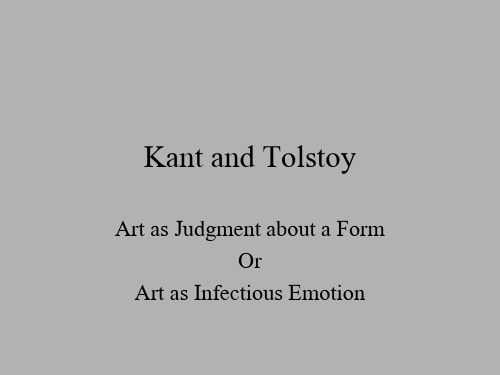
Four Versions of the Annunciation
• • • • Fra Angelico ?? Leonardo DaVinci Sandro Bottecelli El Greco
From Figurative to Abstract
• • • • • Vermeer Turner Klee Abstract Expressionist Artist O’Keefe
Tolstoy’s Aesthetic of Communicating Feeling
• By means of perception, I can feel the same feelings as another who expresses them. • Art infects us with feeling. • Almost all of life involves the activity of art— jokes, lullabies, mimicry, clothing, utensils, religious icons, stories, speeches etc. • Not beauty but human communion through feeling. • Art is dangerous—better that all art be banished than all art is tolera
• Horror is the excitation of our sense of the uncanny, (german unheimlich—”not at homeness”) • In the uncanny we find either a) we have become “other” to ourselves, totally outside of who we are; or b) the “other” outside ourselves has possessed us from within • The familiar is made absolutely unfamiliar, or the unfamiliar is made absolutely familiar.
康德名言英语
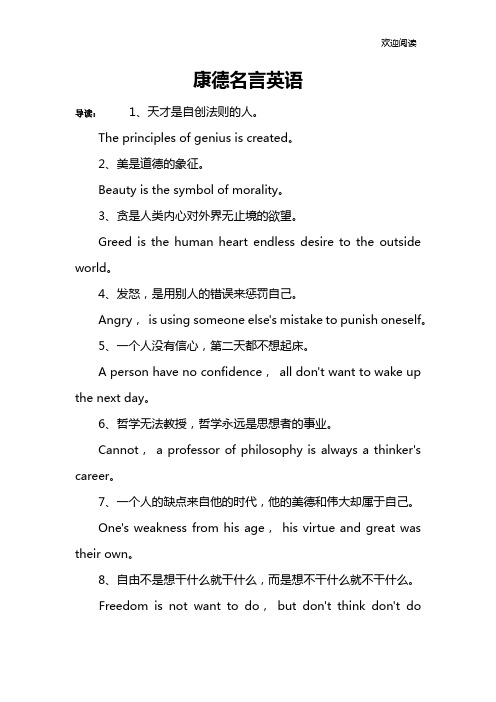
康德名言英语导读:1、天才是自创法则的人。
The principles of genius is created。
2、美是道德的象征。
Beauty is the symbol of morality。
3、贪是人类内心对外界无止境的欲望。
Greed is the human heart endless desire to the outside world。
4、发怒,是用别人的错误来惩罚自己。
Angry,is using someone else's mistake to punish oneself。
5、一个人没有信心,第二天都不想起床。
A person have no confidence,all don't want to wake up the next day。
6、哲学无法教授,哲学永远是思想者的事业。
Cannot,a professor of philosophy is always a thinker's career。
7、一个人的缺点来自他的时代,他的美德和伟大却属于自己。
One's weakness from his age,his virtue and great was their own。
8、自由不是想干什么就干什么,而是想不干什么就不干什么。
Freedom is not want to do,but don't think don't doanything。
9、要评判美,就要有一个有修养的心灵。
To judge the United States,there must be a has the tutelage of the mind。
10、三样东西有助于缓解生命的辛劳:希望,睡眠和微笑。
Three things help to ease the pains in life:hope,sleep and smile。
11、位我上者,灿烂星空;道德律令,在我心中。
康德名言英文

康德名言英文康德名言英文导读:本文是关于康德名言英文,如果觉得很不错,欢迎点评和分享!1、Pain is forced to leave the place。
痛苦就是被迫离开原地。
2、Moral first requirement is governed themselves。
道德首先被要求的是支配自己。
3、I was lonely,I was free,I was their emperor。
我是孤独的,我是自由的,我就是自己的帝王。
4、Angry with someone else's mistake to punish themselves。
发怒,是用别人的错误来惩罚自己。
5、No life goals,just without a compass and navigation。
没有目标而生活,恰如没有罗盘而航行。
6、To judge the United States,there should be a cultivated mind。
要评判美,就要有一个有修养的心灵。
7、As long as you dutifully,people will respect you sincerely。
只要你尽职尽责,人们都会由衷地对你尊敬。
8、Obligation philosophy is to remove misunderstanding born fantasy。
哲学的义务是,去除因误解而生的幻想。
9、I am in awe,the moral law is the head of the stars and hearts。
我所敬畏的,是头上的星空和心中的道德律。
10、Three things help alleviate pains of life:hope,sleepand smiling。
三样东西有助于缓解生命的辛劳:希望,睡眠和微笑。
11、Professor of philosophy can not,philosophical thinker is always the cause。
康德名言短句英文作文

康德名言短句英文作文1. The only thing I know is that I know nothing.2. Act in such a way that you treat humanity, whether in your own person or in the person of any other, never merely as a means to an end, but always at the same time as an end.3. Two things fill the mind with ever new and increasing admiration and awe, the more often and steadily we reflect upon them: the starry heavens above me and the moral law within me.4. Have the courage to use your own understanding!5. Live your life as though your every act were to become a universal law.6. All thought must, directly or indirectly, by way of certain characters, relate ultimately to intuitions, andtherefore, with us, to sensibility, because in no other way can an object be given to us.7. Experience without theory is blind, but theory without experience is mere intellectual play.8. Morality is not properly the doctrine of how we may make ourselves happy, but how we may make ourselves worthy of happiness.9. Nothing is divine but what is agreeable to reason.10. Science is organized knowledge. Wisdom is organized life.。
康德:什么是启蒙运动[英文版]
![康德:什么是启蒙运动[英文版]](https://img.taocdn.com/s3/m/64e4e74c49d7c1c708a1284ac850ad02de8007fb.png)
康德:什么是启蒙运动[英文版]What Is Enlightenment?By Immanuel KantThe 18th-century German philosopher Immanuel Kant published his influential work The Critique of Pure Reason in 1781. Three years later, he expanded on his study of the modes of thinking with an essay entitled "What is Enlightenment?" In this 1784 essay, Kant challenged readers to "dare to know," arguing that it was not only a civic but also a moral duty to exercise the fundamental freedoms of thought and expression.Enlightenment is man’s leaving his self-caused immaturity. Immaturity is the incapacity to use one's intelligence without the guidance of another. Such immaturity is self-caused if it is not caused by lack of intelligence, but by lack of determination and courage to use one's intelligence without being guided by another. Sapere Aude! [Dare to know!] Have the courage to use your own intelligence! is therefore the motto of the enlightenment.Through laziness and cowardice a large part of mankind, even after nature has freed them from alien guidance, gladly remain immature. It is because of laziness and cowardice that it is so easy for others to usurp the role of guardians. It is so comfortable to be a minor! If I have a book which provides meaning for me, a pastor who has conscience for me, a doctorwho will judge my diet for me and so on, then I do not need to exert myself. I do not have any need to think; if I can pay, others will take over the tedious job for me. The guardians who have kindly undertaken the supervision will see to it that by far the largest part of mankind, including the entire "beautiful sex," should consider the step into maturity, not only as difficult but as very dangerous.After having made their domestic animals dumb and having carefully prevented these quiet creatures from daring to take any step beyond the lead-strings to which they have fastened them, these guardians then show them the danger which threatens them, should they attempt to walk alone. Now this danger is not really so very great; for they would presumably learn to walk after some stumbling. However, an example of this kind intimidates and frightens people out of all further attempts.It is difficult for the isolated individual to work himself out of the immaturity which has become almost natural for him. He has even become fond of it and for the time being is incapable of employing his own intelligence, because he has never been allowed to make the attempt. Statutes and formulas, these mechanical tools of a serviceable use, or rather misuse, of his natural faculties, are the ankle-chains of a continuous immaturity. Whoever threw it off would make an uncertain jump over the smallest trench because he is not accustomed to such free movement. Therefore there are only a few who have pursued a firm path and have succeeded in escaping from immaturity by their own cultivation of themind.But it is more nearly possible for a public to enlighten itself: this is even inescapable if only the public is given its freedom. For there will always be some people who think for themselves, even among the self-appointed guardians of the great mass who, after having thrown off the yoke of immaturity themselves, will spread about them the spirit of a reasonable estimate of their own value and of the need for every man to think for himself. It is strange that the very public, which had previously been put under this yoke by the guardians, forces the guardians thereafter to keep it there if it is stirred up by a few of its guardians who are themselves incapable of all enlightenment. It is thus very harmful to plant prejudices, because they come back to plague those very people who themselves (or whose predecessors) have been the originators of these prejudices. Therefore a public can only arrive at enlightenment slowly. Through revolution, the abandonment of personal despotism may be engendered and the end of profit-seeking and domineering oppression may occur, but never a true reform of the state of mind. Instead, new prejudices, just like the old ones, will serve as the guiding reins of the great, unthinking mass.All that is required for this enlightenment is freedom; and particularly the least harmful of all that may be called freedom, namely, the freedom for man to make public use of his reason in all matters. But I hear people clamor on all sides: Don't argue! The officer says: Don't argue, drill! The tax collector: Don't argue, pay! The pastor: Don't argue, believe!(Only a single lord in the world says: Argue, as much as you want to and about what you please, but obey!) Here we have restrictions on freedom everywhere. Which restriction is hampering enlightenment, and which does not, or even promotes it? I answer: The public use of a man's reason must be free at all times, and this alone can bring enlightenment among men: while the private use of a man's reason may often be restricted rather narrowly without thereby unduly hampering the progress of enlightenment.I mean by the public use of one's reason, the use which a scholar makes of it before the entire reading public. Private use I call the use which he may make of this reason in a civic post or office. For some affairs which are in the interest of the commonwealth a certain mechanism is necessary through which some members of the commonwealth must remain purely passive in order that an artificial agreement with the government for the public good be maintained or so that at least the destruction of the good be prevented. In such a situation it is not permitted to argue; one must obey. But in so far as this unit of the machine considers himself as a member of the entire commonwealth, in fact even of world society; in other words, he considers himself in the quality of a scholar who is addressing the true public through his writing, he may indeed argue without the affairs suffering for which he is employed partly as a passive member. Thus it would be very harmful if an officer who, given an order by his superior, should start, while in the service, to argue concerning the utility or appropriateness of that command. He must obey, but he cannot equitably be prevented frommaking observations as a scholar concerning the mistakes in the military service nor from submitting these to the public for its judgment. The citizen cannot refuse to pay the taxes imposed upon him. Indeed, a rash criticism of such taxes, if they are the ones to be paid by him, may be punished as a scandal which might cause general resistance. But the same man does not act contrary to the duty of a citizen if, as a scholar, he utters publicly his thoughts against the undesirability or even the injustice of such taxes. Likewise a clergyman is obliged to teach his pupils and his congregation according to the doctrine of the church which he serves, for he has been accepted on that condition. But as a scholar, he has full freedom, in fact, even the obligation, to communicate to the public all his diligently examined and well-intentioned thoughts concerning erroneous points in that doctrine and concerning proposals regarding the better institution of religious and ecclesiastical matters. There is nothing in this for which the conscience could be blamed. For what he teaches according to his office as one authorized by the church, he presents as something in regard to which he has no latitude to teach according to his own preference.… He will say: Our church teaches this or that, these are the proofs which are employed for it. In this way he derives all possible practical benefit for his congregation from rules which he would not himself subscribe to with full conviction. But he may nevertheless undertake the presentation of these rules because it is not entirely inconceivable that truth may be contained in them. In any case, there is nothing directly contrary to inner religion to be found in such doctrines. For, should he believe that the latter was not the case he could notadminister his office in good conscience; he would have to resign it. Therefore the use which an employed teacher makes of his reason before his congregation is merely a private use since such a gathering is always only domestic, no matter how large. As a priest (a member of an organization) he is not free and ought not to be, since he is executing someone else's mandate. On the other hand, the scholar speaking through his writings to the true public which is the world, like the clergyman making public use of his reason, enjoys an unlimited freedom to employ his own reason and to speak in his own person. For to suggest that the guardians of the people in spiritual matters should always be immature minors is a nonsense which would mean perpetuating forever existing nonsense.But should a society of clergymen, for instance an ecclesiastical assembly, be entitled to commit itself by oath to a certain unalterable doctrine in order to perpetuate an endless guardianship over each of its members and through them over the people? I answer that this is quite inconceivable. Such a contract which would be concluded in order to keep humanity forever from all further enlightenment is absolutely impossible, even should it be confirmed by the highest authority through parliaments and the most solemn peace treaties. An age cannot conclude a pact and take an oath upon it to commit the succeeding age to a situation in which it would be impossible for the latter to enlarge even its most important knowledge, to eliminate error and altogether to progress in enlightenment. Such a thing would be a crime against human nature, the original destiny of which consistsin such progress. Succeeding generations are entirely justified in discarding such decisions as unauthorized and criminal. The touchstone of all this to be agreed upon as a law for people is to be found in the question whether a people could impose such a law upon itself. Now it might be possible to introduce a certain order for a definite short period as if in anticipation of a better order. This would be true if one permitted at the same time each citizen and especially the clergyman to make his criticisms in his quality as a scholar.… In the meantime, the provisional order might continue until the insight into the particular matter in hand has publicly progressed to the point where through a combination of voices (although not, perhaps, of all) a proposal may be brought to the crown. Thus those congregations would be protected which had agreed to (a changed religious institution) according to their own ideas and better understanding, without hindering those who desired to allow the old institutions to continue.…A man may postpone for himself, but only for a short time, enlightening himself regarding what he ought to know. But to resign from such enlightenment altogether either for his own person or even more for his descendants means to violate and to trample underfoot the sacred rights of mankind. Whatever a people may not decide for themselves, a monarch may even less decide for the people, for his legislative reputation rests upon his uniting the entire people's will in his own. If the monarch will only see to it that every true or imagined reform (of religion) fits in with the civil order, he had best let his subjects do what they consider necessary forthe sake of their salvation; that is not his affair. His only concern is to prevent one subject from hindering another by force, to work according to each subject's best ability to determine and to promote his salvation. In fact, it detracts from his majesty if he interferes in such matters and subjects to governmental supervision the writings by which his subjects seek to clarify their ideas (concerning religion). This is true whether he does it from his own highest insight, for in this case he exposes himself to the reproach: Caesar non est supra grammaticos [Caesar is not above the laws of grammar]; it is even more true when he debases his highest power to support the spiritual despotism of some tyrants in his state against the rest of his subjects.The question may now be put: Do we live at present in an enlightened age? The answer is: No, but in an age of enlightenment. Much still prevents men from being placed in a position or even being placed into position to use their own minds securely and well in matters of religion. But we do have very definite indications that this field of endeavor is being opened up for men to work freely and reduce gradually the hindrances preventing a general enlightenment and an escape from self-caused immaturity. In this sense, this age is the age of enlightenment and the age of(the Great)[Frederick II of].A prince should not consider it beneath him to declare that he believes it to be his duty not to prescribe anything to his subjects in matters of religion but to leave to them complete freedom in such things. In other words, a princewho refuses the conceited title of being "tolerant," is himself enlightened. He deserves to be praised by his grateful contemporaries and descendants as the man who first freed humankind of immaturity, at least as far as the government is concerned and who permitted everyone to use his own reason in all matters of conscience. Under his rule, venerable clergymen could, regardless of their official duty, set forth their opinions and views even though they differ from the accepted doctrine here and there; they could do so in the quality of scholars, freely and publicly. The same holds even more true of every other person who is not thus restricted by official duty. This spirit of freedom is spreading even outside (the country ofthe Great) to places where it has to struggle with the external hindrances imposed by a government which misunderstands its own position. For an example is illuminating them which shows that such freedom (public discussion) need not cause the slightest worry regarding public security and the unity of the commonwealth. Men raise themselves by and by out of backwardness if one does not purposely invent artifices to keep them down.I have emphasized the main point of enlightenment, that is of man's release from his self-caused immaturity, primarily in matters of religion. I have done this because our rulers have no interest in playing the guardian of their subjects in matters of arts and sciences. Furthermore immaturity in matters of religion is not only most noxious but also most dishonorable. But the point of view of a head of state who favors freedom in the arts and sciences goes even farther; for he understands that there is no danger in legislation permitting his subjectsto make public use of their own reason and to submit publicly their thoughts regarding a better framing of such laws together with a frank criticism of existing legislation. We have a shining example of this; no prince excels him whom we admire. Only he who is himself enlightened does not fear spectres when he at the same time has a well-disciplined army at his disposal as a guarantee of public peace. Only he can say what (the ruler of a)dare not say: Argue as much as you want and about whatever you want but obey! Thus we see here as elsewhere an unexpected turn in human affairs just as we observe that almost everything therein is paradoxical. A great degree of civic freedom seems to be advantageous for the freedom of the spirit of the people and yet it establishes impassable limits. A lesser degree of such civic freedom provides additional space in which the spirit of a people can develop to its full capacity. Therefore nature has cherished, within its hard shell, the germ of the inclination and need for free thought. This free thought gradually acts upon the mind of the people and they gradually become more capable of acting in freedom. Eventually, the government is also influenced by this free thought and thereby it treats man, who is now more than a machine, according to his dignity.。
- 1、下载文档前请自行甄别文档内容的完整性,平台不提供额外的编辑、内容补充、找答案等附加服务。
- 2、"仅部分预览"的文档,不可在线预览部分如存在完整性等问题,可反馈申请退款(可完整预览的文档不适用该条件!)。
- 3、如文档侵犯您的权益,请联系客服反馈,我们会尽快为您处理(人工客服工作时间:9:00-18:30)。
康德名言英文
导读:本文是关于康德名言英文,如果觉得很不错,欢迎点评和分享!
1、Pain is forced to leave the place。
痛苦就是被迫离开原地。
2、Moral first requirement is governed themselves。
道德首先被要求的是支配自己。
3、I was lonely,I was free,I was their emperor。
我是孤独的,我是自由的,我就是自己的帝王。
4、Angry with someone else's mistake to punish themselves。
发怒,是用别人的错误来惩罚自己。
5、No life goals,just without a compass and navigation。
没有目标而生活,恰如没有罗盘而航行。
6、To judge the United States,there should be a cultivated mind。
要评判美,就要有一个有修养的心灵。
7、As long as you dutifully,people will respect you sincerely。
只要你尽职尽责,人们都会由衷地对你尊敬。
8、Obligation philosophy is to remove misunderstanding born fantasy。
哲学的义务是,去除因误解而生的幻想。
9、I am in awe,the moral law is the head of the stars and hearts。
我所敬畏的,是头上的星空和心中的道德律。
10、Three things help alleviate pains of life:hope,sleep
and smiling。
三样东西有助于缓解生命的辛劳:希望,睡眠和微笑。
11、Professor of philosophy can not,philosophical thinker is always the cause。
哲学无法教授,哲学永远是思想者的事业。
12、The world's most amazing is that my head and heart Splendid Star ethics。
世上最奇妙的是我头上灿烂星空和内心的道德准则。
13、Men are likely to be investigated,but the woman did not reveal their secrets。
男人是容易被考察的,女人却并不泄露自己的秘密。
14、Freedom is not do what you want to do,but does not want to do is not doing。
自由不是想干什么就干什么,而是想不干什么就不干什么。
15、The disadvantage of a person from his era,but his own virtues and greatness。
一个人的缺点来自他的时代,他的美德和伟大却属于自己。
16、The so-called religion,our obligation is to be seen as everything is God's command。
所谓宗教,就是把我们的义务的一切都看作是神的命令。
17、A man was saying must be true,but he did not need to say that he knows it。
一个人说出来的话必须是真的,但是他没有必要把他知道的都说出来。
18、Honest and better than all the resourcefulness,and it
is the basic condition resourcefulness。
诚实比一切智谋更好,而且它是智谋的基本条件。
19、When the love I need when I am not qualified,when
I need love,but he left me。
当爱情需要我的时候我没有资格,当我需要爱情的时候,他却离我而去。
20、You can enrich the soul of things,but the shining stars of the sky,and my inner moral law。
能充实心灵的东西,乃是闪烁着星星的苍穹,以及我内心的道德律。
21、The so-called religion,refers to everything we have to assume the obligations in terms of God's command。
所谓的宗教,是指我们的一切义务都要当做上帝的命令而言。
22、The morality of an act does not depend on its results,but only depends on the intention behind the act。
一个行为的道德性不取决于它的结果,而仅仅取决于该行为背后的意图。
23、The more the more busy we felt strongly that we are alive,the more aware of the existence of our lives。
我们越是忙越能强烈地感到我们是活着,越能意识到我们生命的存在。
24、Now that I have embarked on this path,then,should not interfere with anything I go along this road。
既然我已经踏上这条道路,那么,任何东西都不应妨碍我沿着这条路走下去。
25、The sea is great,except that it beautiful,magnificent,magnanimous,there is a self-purification function。
大海之所
以伟大,除了它美丽、壮阔、坦荡外,还有一种自我净化的功能。
26、The more deliberately want comfort and happiness in life,then this person is not truly satisfy more。
越是处心积虑地想得到生活上的舒适和幸福,那么这个人就越是得不到真正的满足。
27、Freedom is not what makes you want to do,freedom to teach what you do not want to do,you can not do anything。
自由不是让你想做什么就做什么,自由是教你不想做什么,就可以不做什么。
28、There are two types of people in awe,it is the head of
a limitless sky,and the other is the idea of the infinite heart。
人有两种敬畏,一个是头顶无限的星空,另一个是内心无限的思想。
29、There are two things the more the more they ponder shock and awe,that is ethics Star on my head and my heart。
有两件事物越思考就越觉得震撼与敬畏,那便是我头上的星空和我心中的道德准则。
30、Conscience is an instinct to judge ourselves according to the moral norm,it's not just an ability;it is an instinct。
良心是一种根据道德准则来判断自己的本能,它不只是一种能力;它是一种本能。
31、Reason one hand and their own principles,single-handedly brought out the study based on the theory and experiment,went natural。
理性一手拿着自己的原理,一手
拿来着根据那个原理研究出来和实验,奔赴自然。
